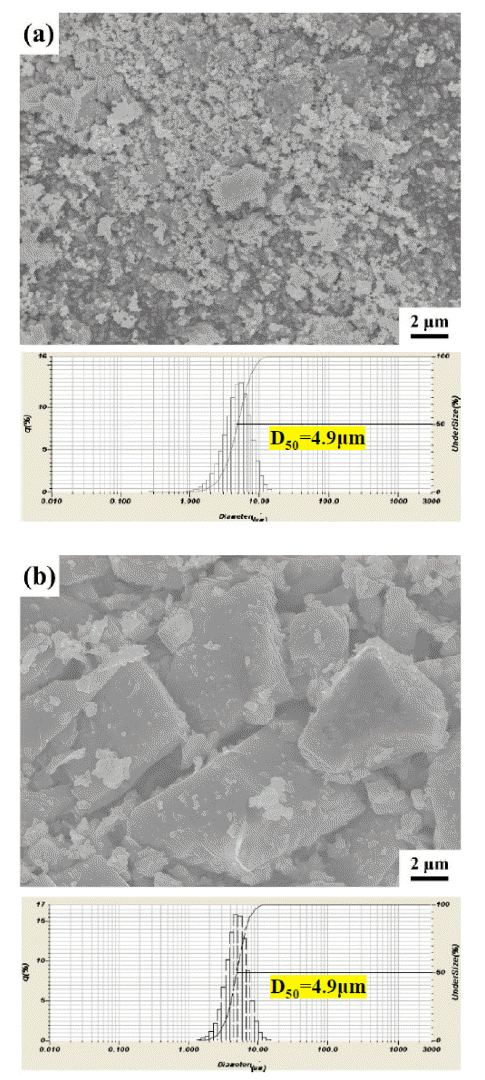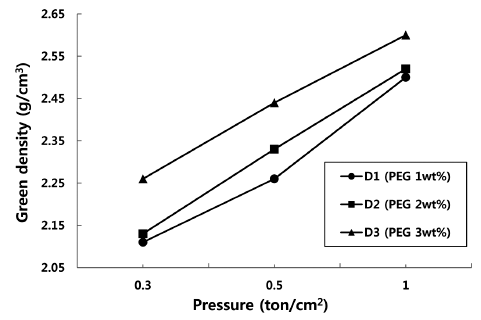Search
- Page Path
- HOME > Search
- [Korean]
- Fabrication and Characteristics of YSZ-TiC Ceramics Composite by Using Hot Pressing
- Jae-Hyung Choi, Ji-Young Choi, Seongwon Kim
- J Korean Powder Metall Inst. 2021;28(5):381-388. Published online October 1, 2021
- DOI: https://doi.org/10.4150/KPMI.2021.28.5.381

- 1,515 View
- 3 Download
- 1 Citations
-
 Abstract
Abstract
 PDF
PDF Zirconia has excellent mechanical properties, such as high fracture toughness, wear resistance, and flexural strength, which make it a candidate for application in bead mills as milling media as well as a variety of components. In addition, enhanced mechanical properties can be attained by adding oxide or non-oxide dispersing particles to zirconia ceramics. In this study, the densification and mechanical properties of YSZ-TiC ceramic composites with different TiC contents and sintering temperatures are investigated. YSZ - x vol.% TiC (x=10, 20, 30) system is selected as compositions of interest. The mixed powders are sintered using hot pressing (HP) at different temperatures of 1300, 1400, and 1500°C. The densification behavior and mechanical properties of sintered ceramics, such as hardness and fracture toughness, are examined.
-
Citations
Citations to this article as recorded by- Phase Formation and Mechanical Property of YSZ‒30 vol.% WC Composite Ceramics Fabricated by Hot Pressing
Jin-Kwon Kim, Jae-Hyeong Choi, Nahm Sahn, Sung-Soo Ryu, Seongwon Kim
journal of Korean Powder Metallurgy Institute.2023; 30(5): 409. CrossRef
- Phase Formation and Mechanical Property of YSZ‒30 vol.% WC Composite Ceramics Fabricated by Hot Pressing
- [Korean]
- Effect of Organic Additives on Microstructure and Green Density of Zirconia Granules Using Water Solvent
- Ji-Hwan Jung, Sang-Jin Lee
- J Korean Powder Metall Inst. 2017;24(2):147-152. Published online April 1, 2017
- DOI: https://doi.org/10.4150/KPMI.2017.24.2.147

- 1,637 View
- 31 Download
- 2 Citations
-
 Abstract
Abstract
 PDF
PDF Spherical-type zirconia granules are successfully fabricated by a spray-drying process using a water solvent slurry, and the change in the green density of the granule powder compacts is examined according to the organic polymers used. Two organic binders, polyvinyl alcohol (PVA) and 2-hydroxyethyl methacrylate (HEMA), which are dissolved in a water solvent and have different degrees of polymerization, are applied to the slurry with a plasticizer (polyethylene glycol). The granules employing a binder with a higher degree of polymerization (PVA) are not broken under a uniaxial press; consequently, they exhibit a poor green density of 2.4 g/cm3. In contrast, the granule powder compacts employing a binder with a lower degree of polymerization (HEMA) show a higher density of 2.6 g/cm3 with an increase in plasticizer content. The packing behavior of the granule powders for each organic polymer system is studied by examining the microstructure of the fracture surface at different applied pressures.
-
Citations
Citations to this article as recorded by- Effects of TiO2 Addition and Processing Variables on the Properties of Black Aluminum Nitride
Min-Kwon Park, Sin-Il Go, Kwang-Hee Han, Sang-Jin Lee
Korean Journal of Materials Research.2025; 35(8): 345. CrossRef - Uniaxial compaction and sintering of ZrO2−3 mol% Y2O3 using rubber and PEG solutions as binders
M.I. Dvornik, O.O. Shichalin, E.A. Mikhailenko, A.A. Burkov, S.V. Nikolenko, N.M. Vlasova, E.V. Chernyakov, A.A. Gnidenko, P.G. Chigrin, I. Yu Buravlev, N.S. Konovalova
Materials Chemistry and Physics.2024; 328: 129981. CrossRef
- Effects of TiO2 Addition and Processing Variables on the Properties of Black Aluminum Nitride
TOP
 KPMI
KPMI


 First
First Prev
Prev


